
President Donald Trump Saturday said he has canceled meetings with the Afghan Taliban and President Ashraf Ghani that were secretly scheduled for Sunday in Washington before announcement of a peace agreement toward ending the longest running American war.
The Trump revelation of the cancellation of the previously unannounced talks came just days before the 18th anniversary of 9/11 terror attacks – the primary reason for the U.S. invasion of Afghanistan that began October 7, 2001.
U.S. Special Envoy Zalmay Khalilzad had led several rounds of Pakistan-facilitated talks with the Afghan Taliban representatives in Doha, Qatar before agreeing “in principle” on a peace deal that would have allowed U.S. military withdrawal from the landlocked country.
Trump cited the Taliban’s unrelenting attacks and failure to pursue a ceasefire while announcing the decision in a tweet.
Unbeknownst to almost everyone, the major Taliban leaders and, separately, the President of Afghanistan, were going to secretly meet with me at Camp David on Sunday. They were coming to the United States tonight. Unfortunately, in order to build false leverage, they admitted to..
— Donald J. Trump (@realDonaldTrump) September 7, 2019
The Trump Administration, unlike the George W Bush and Barack Obama Administrations, narrowed down the end goals from rhetoric. The talks appeared to focus on making the Taliban commit to preventing the Afghan soil from misuse by an international terror group like al-Qaeda leaders who planned and perpetrated 9/11 terror attacks from their Afghan safe havens.
Afghan President Ghani’s government had objected to the draft peace deal. The Afghan Taliban, who, according to some accounts, control more than 60% of the territory, killed a U.S. soldier and dozens of civilians in a spate of bombings.
Afghan women groups had demanded that a firm commitment that the Taliban would not return to their harsh tactics that denied girls and women their fundamental rights.
Afghanistan watchers had said from the beginning that an Afghan reconciliation or peace process would be a tough political process. Former American general David Petraeus was among the critics warning against implications of a rushed peace deal including a possible return of terrorist groups like al-Qaeda.
….only made it worse! If they cannot agree to a ceasefire during these very important peace talks, and would even kill 12 innocent people, then they probably don’t have the power to negotiate a meaningful agreement anyway. How many more decades are they willing to fight?
— Donald J. Trump (@realDonaldTrump) September 7, 2019
Now with the announcement of abrupt cancellation of the summit Afghanistan faces another period of uncertainty and fears of escalation in violence, even as the country – battered by decades of war, government corruption, misplaced policies and shortsighted U.S. and NATO reliance on military force – heads to presidential election.
Despite the U.S. having invested heavily in some socioeconomic projects and paid sacrifices, the Afghans appear to be as nervous and uncertain about their future as ever since the 1980s jehad against the Soviet occupation, which strengthened militants, toppled the country’s traditional and modern social, economic and governance structures and led to a bloody civil war between ethnic groups.












